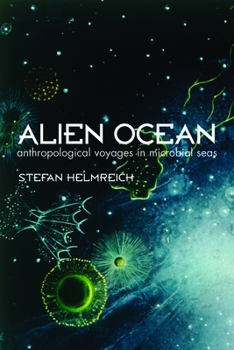Alien Ocean: Anthropological Voyages in Microbial Seas
Select Format
Select Condition 
Book Overview
Alien Ocean immerses readers in worlds being newly explored by marine biologists, worlds usually out of sight and reach: the deep sea, the microscopic realm, and oceans beyond national boundaries. Working alongside scientists at sea and in labs in Monterey Bay, Hawai'i, the Woods Hole Oceanographic Institution, and the Sargasso Sea and at undersea volcanoes in the eastern Pacific, Stefan Helmreich charts how revolutions in genomics, bioinformatics, and remote sensing have pressed marine biologists to see the sea as animated by its smallest inhabitants: marine microbes. Thriving in astonishingly extreme conditions, such microbes have become key figures in scientific and public debates about the origin of life, climate change, biotechnology, and even the possibility of life on other worlds.
Format:Paperback
Language:English
ISBN:0520250621
ISBN13:9780520250628
Release Date:January 2009
Publisher:University of California Press
Length:422 Pages
Weight:1.60 lbs.
Dimensions:0.9" x 5.9" x 8.9"
Customer Reviews
1 rating
Alien Ocean
Published by Thriftbooks.com User , 15 years ago
Stefan Helmreich, a professor of anthropology at MIT, offers his motivation for writing Alien Ocean by revealing that he thinks biology's vision of the ocean is in transformation. He proffers that his book is simply an anthropological account of the efforts being made to study the dark ocean through the light of microbial research. Throughout the chapters, we follow Helmreich aboard the submersible Alvin at Juan del Fuca ridge, at the remote controls of the robot Ventana in Monterey bay, on the Hawaiian island of Oahu, and into the cosmos through the satellite imaging of Mars, Jupiter, and Europa. Helmreich's method of viewing anthropology through microbial research is to tell of his experience relating to different researchers, describing their research in their words as well as his own, and applying what he has learned to anthropology. Helmreich's strongest points in the book are born from his skill in describing not only the physical research and how it affects our lives, but how his experiences felt and the very personal emotions in encompassing the possibilities that might emerge from microbial research. Another of the book's strong points is the number of anthropological subjects it relates to microbial research and vice versa briefly but effectively. Helmreich manages to discuss genomics, bioinformatics, remote sensing, cybernetics, gender biasing, sociology, racism, the history of the south Georgia islands, Gaia theory, evolutionary theory, extraterrestrial life, blue-green capitalism, the tree of life, and Hawaiian politics. Microbial research is relevant to anthropology, but beware Helmreich's tendency to delve into anthropological thought and academic vocabulary. Alien Ocean is not suited for readers seeking a hyper technical discussion of microbial research but is extremely effective in backing up Helmreich's main anthropological point. Stefan Helmreich has done an admirable job of composing a book that people with an interest in microbiology or anthropology will enjoy.






